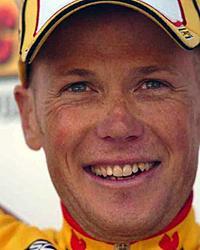
Recently on Cyclingnews.com |
An interview with Chris Horner, June 29, 2005
I am going to the Tour!
In his 10 years as a professional, Chris Horner has possibly had more chances than most of riding the Tour de France without actually having ridden it. For one reason or another, ranging from personal, to physical, to mental, things just never clicked when the opportunity arose.
But one day in Arosa changed all that, and with just a few days to go before the 92nd edition of La Grand Boucle, one of America's most talented riders is ready to ride his first lap around France. Story by Anthony Tan.
I had scheduled an interview with Chris Horner the evening of June 16. It was at the Tour de Suisse, the day he took his first pro win in Europe after soloing to victory on the first serious mountain stage of the race.
I honestly didn't expect him to be available. After all, I'd stood him up the previous two nights, and now, after one of the most significant moments - perhaps the most significant - in his cycling career, surely he wanted to celebrate the victory with his team-mates rather than some cycling hack?
But when I call Room 514 at the Valsana Sporting Hotel in Arosa (now 9pm), I get the following response: "Perfect, c'mon up."
"We just toasted with some champagne, real easy," Horner says when I asked how he celebrated his win today. "There's work still here to do, and very soon after that is the Tour."
"The Tour? You're going?"
"I did it - they told me!" he exclaims with a smile from ear to ear.
"I heard it all through the team, 'Tim Johnson this, Tim Johnson that - how are you going to do?'"- After Tim Johnson's lacklustre performance with the same team, the pressure was on Horner right from the start |
"Yeah, yeah... Matxin [Joxean Fernandez], the director of the team, told me: 'Yeah, you're on the Tour list.' So now it's official!" he giggles like a boy who got to open one of his presents the night before Christmas.
"But it was a very satisfying win, it relieved a lot of stress and no matter what happens now - if I crash out or break a leg or whatever - I won a stage of the Tour de Suisse," he says, underlying the importance of the events that took place today.
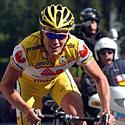
|
"You look at the quality of the field here, it's one of the tops, and there's no doubt in my mind that this is one of the hardest races in the world next to doing the Tour."
Joining his Saunier Duval-Prodir team towards the end of last season from Webcor, a complete unknown in the European cycling scene and by no means one of the biggies back in States, was considered a big step for Horner. Sure, he'd spent three years with La Franšaise des Jeux from 1997 to 1999, but as he admits, they weren't his greatest years - and that was six years ago.
However, at the 2004 world road championships in Verona, the then 32 year-old slipped into racing at the highest level with apparent ease. One of only 15 to finish on the same time as three-time winner Oscar Freire, his seventh place finish made him the best-placed American finisher by a massive 71 places; 78th was Guido Trenti, who came in almost 10 minutes down.
Two weeks later, he showed Verona was no fluke at the final World Cup event of the year which was also the final World Cup ever (the UCI ProTour set to make its debut in 2005), finishing 11th at the 'race of the falling leaves', the Giro di Lombardia. Again, he was the best from the US - but this time, he was the only American rider to finish, the race's difficulty leading to a 61 percent attrition rate.
"Those last three weeks went a long way in the way the directors and stuff have treated me than what they would have for a guy who's only done 10 races for the team," he says.
10 races? But aren't we at the end of June here?
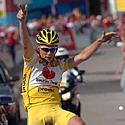
|
Wanting to make the most of the good weather back in the States and avoid an unusually long and cold European winter, Horner didn't reacquaint himself with his team until a few days before the start of Tirreno-Adriatico on March 9.
The first day was no problem. But on the second stage, he was involved in a pile-up 20 kilometres from the finish after losing control of his bike on a section of gravel. At first, it appeared he wasn't too badly hurt, but after finishing third-last the next day, the American had enough experience to know it was something more serious, played it safe, and pulled out of the race.
A week later at the Setmana-Catalana stage race in Spain, it appeared Horner had mostly recovered from his injuries, scoring two top-10 finishes before finishing 16th on GC to overall winner Alberto Contador from Liberty Seguros. However, what he didn't find out until one week later was that he rode the entire race on a fractured left leg.
"It didn't make life easier that I wasn't here for training camp; I skipped the first five weeks of the season - and when I get here, I fall down on my bike, break my leg and disappear again, so someone's always filling in for me. I mean, there's guys on my team that I don't even know!" he remarks about his early season tale of woe.
And for those who did know him, or have at least heard of him, they weren't too sure about the team's token American signing, despite a good end of season performance the previous year. The last American rider on the team, Tim Johnson, regularly found himself out of his depth in Europe, and returned home after less than a season completed.
"He had the same problem I had at Franšaise des Jeux," says Horner. "But I heard it all through the team, 'Tim Johnson this, Tim Johnson that - how are you going to do?'
"What people saw of him in Europe was not what Tim Johnson in capable of - but because he rode bad, when I got here, that's what they thought of me, too."
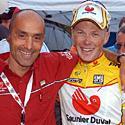
|
While Horner fared much better than Johnson did during his time with FdJ, in fact going as far to earn himself a spot on their Tour de France team in 1998 before he breaking his wrist on the final day of the Midi LibrÚ, it was still a very difficult period for him. An American from San Diego moving to Paris for the first time could quite easily be described as culture-shock of the highest order, and as Horner admits, riding his bike wasn't the hard part.
"I've always said this and I've always believed it: the riding part was never the difficult part; the difficult part for me was off the bike. It doesn't need to be explained to me - I lived through it for three years - I completely, 100 percent understand, but absolutely, [Johnson's performances] definitely had an effect."
Chuckles Horner, "I don't know even if I have it down yet," adding that even today, he's doesn't even have a semi-permanent place to live in Europe, describing himself as a gypsy of sorts.
"I just know things get a whole lot easier when you have a good support system around you, you have good people helping you out, and the team looks after you more. At Franšaise des Jeux, aside from [directeur-sportif] Alain Gallopin, I was kind of told: 'You've got to do it like this, you've got to do it like that.'"
"I won so much stuff in the States, it just did not make sense not to win in Europe - and the other thing is, I want to do the Tour de France."- Despite three tough years at La Franšaise des Jeux, Horner says the lure of the Tour de France was always calling him back |
It was a good thing Saunier Duval team management had enough faith in Horner to give him the time off he needed, who, after discovering his leg was broken, told himself that he wasn't going to race again until he was 100 percent recovered.
After just three weeks' training, Horner found himself competitive again at the Wachovia Cycling Series. Sixth at Lancaster, then sixth again at Trenton, it appeared he was on a mission. "I just focused everything on 'I'm going [to the Tour de France],'" he says.
Blowing his Horn(er) on LanceWhen the subject of Lance Armstrong is brought up, Chris Horner has plenty to say on his fellow American - but LA's much-talked about recon missions isn't one of them. "Well, there's a lot of things he does better, but reconnaissance missions, that's nothing new," he says. "The press really plays on that a lot, but all the riders do that; there's nothing new, I guarantee that. "But," says Horner, "he does multiple other things that no one else does. No one [else] has their soigneur and mechanic travelling with them all season long; the top five or top ten riders out there make a lot of money, but they don't spend any of it on making themselves better - Lance makes a lot of money and spends a lot of money on making himself better. I only know one guy out there that flies his own jet - that's Lance. "You figure you fly at least six days a month; flying takes a big toll on your training, on your stress, and the fatigue of your body. Six days out the month, he has no stress, fatigue or anything when he's flying. So that's one week - there's only four in every month - he's got up on everybody... and that's just the plane! "And if you put that aside, he's probably not cooking dinner for himself..." Sheryl's probably not, either, I say, trying to lighten things up a little. But Horner isn't in the mood for joking. "And if you look sponsorship-wise, how many sponsors do you have that are willing to put in the time, effort and money that Lance's sponsors do to make him perform better at the Tour de France? A couple of guys have learned to go into the wind tunnel or something like that, but that's pretty minor compared to the preparation that Lance is doing to be prepared for the Tour." When Marco Pinotti, his room-mate at the Tour de Suisse, says he thinks the same thing but adds, "He started his career like the other riders," Horner quickly interjects. "No - he's always been taken care of. He's always had it easier and better than the other riders. He was always the leader since the beginning; he was always bred to be the leader of the team - this is fact, I'm not guessing this - and what he said, went. From the moment he signed with Motorola, he was the leader of that team." "If he wanted to do six [hours' training], he got to do six, and they worked around it. If the mechanics had to clean the bike at midnight, they'd clean the bike at midnight, and if he needed a massage at one o'clock in the morning, he got it at one o'clock in the morning." "And that's what makes him better. He can still be beat - there's no doubt about it, he can be beat - but man, does he do everything right to make sure to make sure he doesn't." |
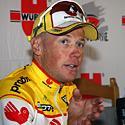
|
"I was literally at a point: 'Either I'm doing the Tour, or maybe I'm going to ask to get out of the contract and sign with a US team.' As soon as I got to Philly, I realised I'd got the training right, everything else was in place to do something; so they didn't know it yet, but I was going - so they might as well make a spot!"
That 'something' was winning the USPRO Championships. Horner knew that Saunier Duval had hired him because they wanted a successful American rider, and it would have been a big call to keep a 'Stars & Stripes' jersey off their Tour squad. Said a fired up Horner to Cyclingnews the day before the race: "I NEED to be doing the Tour is what I am telling you! I NEED TO DO THE TOUR!"
"I came back [to Europe] because I could not end my career without winning something over in Europe. I won so much stuff in the States, it just did not make sense not to win in Europe - and the other thing is, I want to do the Tour de France.
"I've always wanted to do it and be a part of it at least one time during my career; I mean, I've been a professional for 10 years, and it just seems crazy not to have done the Tour during that period - especially since I was three years with Franšaise des Jeux and one year with Mercury, when they should have done it, too."
At Philly, Horner rode an outstanding race. Initiating the break on the Manayunk Wall that brought he and eventual winner Chris Wherry across to Danny Pate to form the final three-man breakaway, driving the break to ensure it succeeded, but then dying at the end to finish third, he says it didn't even take a shower and a fresh set of clothes before he realised what he had to do.
"As soon as I crossed the line, it didn't even take getting back to the hotel; as soon as I saw Wherry won and I knew I wasn't getting the jersey, I thought: 'Okay, that was my second last chance - now I've got to do something at the Tour de Suisse.' But I also knew the form was coming good and it was getting better and better each day."
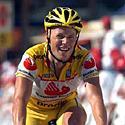
|
But when he 'tanked' the individual time trial at the Tour de Suisse on the second day of the race, finishing three minutes down on Jan Ullrich in 62nd place, Horner admits he became a little concerned. "I was worried - I didn't exactly know where the form went. I had really good form, but that was the first time I'd done back-to-back days."
Given his last stage-race experience was almost three months ago, each stage was another day in unknown territory, but the team's trainer, I˝igo, told him to keep his head and not worry - especially since he only arrived two days before the race started. So the American still had plenty of reasons to stay motivated. As it happened, the TT turned out to be a fluke occurrence that apparently happens once a year for him, whether he has the form or not.
Not only did Horner continue to improve, the 33 year-old went on to take a fantastic first pro win in Europe a few days later, and then rode out of his skin to finish fifth overall on two more very difficult days in the mountains.
... and JanAnd then when I ask about Jan Ullrich and his chances of a second Tour win, the topic of conversation immediately comes back to Lance. "First off, to answer your question", begins Horner, "you'd have to go back and ask: 'Does Lance have the form?' "I've never seen anyone capable of going as fast as Lance is capable of doing. If Ullrich was going like Lance was going in the Tour, he would have caught me, passed me and still be wearing the leader's jersey today," he says the night after his stage win at the Tour de Suisse. "So the first question is: 'Is Lance going as fast as he can?' - that I don't know, I haven't seen him, but who can doubt a six-time Tour champion? He's evidently capable of finding the form, and I certainly don't believe he's too old... because he's my age!" However, one rider has seen a lot of during the week of the Tour de Suisse was Ullrich, and Horner believes the German's going to have to get faster than what he's shown so far if he wants to beat Armstrong. "But if he [Armstrong] hasn't prepared the way that he should", qualifies Horner, "then there's always a possibility that someone can come up and come faster and beat him - and it might be Ullrich." Although Der Kaiser was still some way from his best, Horner adds he's got time on his side, as riders aiming high on the overall classification won't need to start firing on all cylinders until the start of the second week. "So he has plenty of time of finding the form that Ullrich is capable of having. I wouldn't sweat anything at the moment if I was Ullrich or his team," he says. |
"I've f***ing got form comin' out of my ears right now!" he shouted at me when I saw him moments after the final stage in Ulrichen. "Every day, it's just getting better and better."
"I've been fighting over here for jobs and results, and for a long period of time - it's very difficult winning so many races over in the States and coming over here and falling apart," he says, referring to his time with La Franšaise Des Jeux, that until this year's Tour de Suisse, left a semi-permanent scar in his mind.
"I'd fall apart completely before I'd even got to the bike race, it seemed, and that's what happened. Now I'm older, I know what to expect; you have to let the bad days be exactly what they are - just one bad day - and then you just get on with the next day."
Talking about the potential to have a few bad days at the Tour, it's a good thing Horner now knows what to do when it happens. No doubt about it, this man is one of America's best modern-day riders - maybe not up there with Armstrong, though not too far off him, either - but this will be his first ever Grand Tour, and the Tour de France is a nasty place to start.
"They can't go any faster in the Tour, that's for certain," says Horner when I ask him what to expect.
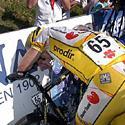
|
"They might go faster for a longer period, but it's not going any faster than it is here... we're going 70k an hour on the flats - you can't go any faster than that. I mean, today [Stage 6], 30 guys attacking on the first climb. You just have to look at that first climb; who was on vacation on that climb - I don't think anyone was on vacation!"
It's true this man isn't afraid of speaking his mind or talking himself up. At the press conference after his stage win, 9 out of 10 journalists hadn't even heard of him, which saw him explain to the media how good a bike rider he believes he actually is. So is there a defence mechanism inside Chris Horner that switches on every now and then?
"Absolutely - you've got to have belief in yourself," he says. "I still haven't shown the team what I've capable of doing. Not much, anyways."
And what about being a relative unknown in Europe - is that an added motivation to become a known?
"No - I don't need that for motivation; I mean, my own motivation was just to prove to myself more than anything else - that I could win here was all the motivation I needed."
Realising I'm well aware of his results when we talk a little about his wins at the Tour de Langkawi in 2000 and the 2003 Tour de Georgia, Horner slowly begins to let his guard down. "Right now, I just want to go [to the Tour]. I just want to be part of the event. I'd love to go and have good form and win a stage or do something big there - but at the moment, just get me there," he says with due caution, knowing anything can still happen between now and July 2.
"Let's just get there first, and then we'll focus on the other stuff afterwards. But one thing's for certain: I'm 100 percent motivated to be there with the best form I could possibly have and I'd like to win something.
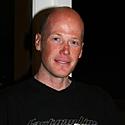
|
"If I retire three, four, five years from now - whatever it may be, who knows - [missing the Tour] would have just left... " his voice trails off, albeit for a brief moment. "I can live without winning a national championship jersey because sometimes it just doesn't fall that way, and I understand that with bike racing - but it would have been rough not to have done the Tour - or at least have a good win in Europe.
"So I've got one out of two out of the way... now I just need to get to the other one!" he says with smile.

